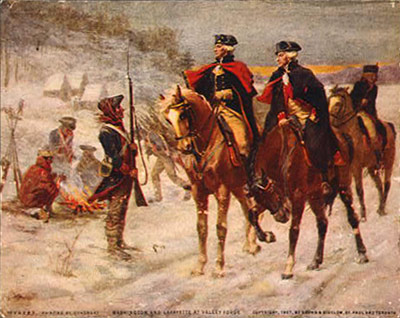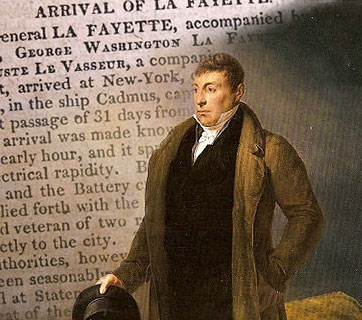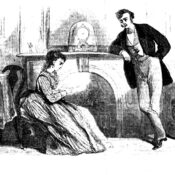In the 43 years since he’d helped America win its independence from Great Britain, the Marquis de Lafayette had become a symbol of the revolution. Fighting alongside Washington, he had forced the British army to surrender, then sailed back to France to transplant liberty in European soil.
Early in 1824, President James Monroe invited Lafayette to return to the nation that still revered him, and the Marquis accepted. And so began a thirteen-month tour across all 24 states, covering 6,000 miles of miserable roads, bone-crunching carriages, and sluggish riverboats, one of which nearly drowned him when it sank in the Ohio river.
For older Americans of the revolutionary generation, Lafayette was a living connection to the great cause in their lives. To see the living hero, after all this time, would help bridge the gulf they felt between the early republic and the modern United States.
For younger Americans, Lafayette’s tour was an opportunity to celebrate the success of their nation. They would see for themselves one of the last founding fathers — a representative of all that their nation stood for.
As for Lafayette himself, this tour was one last chance to see his aging comrades-in-arms and to witness the state of the country he had worked so hard to create.
The Saturday Evening Post reported his arrival on August 21, 1824:
The Marquis Lafayette, the only surviving General of the seven years’ war of our revolution, was conducted from Staten-Island on Monday morning, and landed in New York city, amidst every demonstration of joy and admiration could be bestowed. The news of the General’s arrival had spread though the surrounding country with the rapidity of lightning; and from the dawn of day until noon, the roads and ferry boats were thronged with people who were hastening to the city to participate in the fete, and testify their gratitude for the services, and respect for the character, of the illustrious “National Guest.” Our citizens also turned out in immense numbers at an early hour, and, together with the military, presented the most lively and moving spectacle that we have witnessed on any former occasion.
As a young nobleman, Lafayette has been inspired by all the talk of liberty he heard buzzing about in the salons and Masonic lodges of Paris. When the news arrived that Americans had risen up against Great Britain, he leapt at the chance to fight for the rights of man. And, because he was French, to humble Great Britain. And, because he was a young man, win glory on the battlefield.
He stole away to America, expecting to be given an army to command but, upon his arrival, found he would not be given any troops, or even a military rank. At this point, Lafayette proved he was more than just a priviliged adventurer. He volunteered to serve without rank and even donated his own money to the war effort. Impressed by the sincerity and enthusiasm of this young man and fellow Mason, Washington appointed him to his headquarters staff.
Within a month, Lafayette proved the wisdom of Washington’s judgment. At Brandywine Creek, he stepped in to act as a division commander when American soldiers broke and ran from an assault by British and Hessian troops. Though shot through the leg, he remained on his horse to rally the soldiers, mount a rear-guard defense, fight off another British attack, and skillfully withdraw the Americans to safety.

He remained at Washington’s side throughout the bitter Valley Forge Winter, and helped thwart a congressional plan to replace Washington with General Nathanial Greene. He led troops at the battle of Gloucester and was instrumental in the victory at Monmouth. By now, Washington and Congress regarded Lafayette as one of their best generals. Even Lord Cornwallis, commander of the British forces, recognized his importance and launched several attacks on the colonials to capture the Marquis.
In 1779, Lafayette sailed back to France to beg King Louis XVI for more soldiers and boats, then quickly returned to America, where he was given command of his own army. In 1781, the young General drove Cornwallis back across Virginia until he and Washington trapped the British at Yorktown and forced their surrender.
Now, at age 67, he was being showered with honors and crowded by the ecstatic veterans of that long-ago war.
Decidedly the most interesting sight was the [New York] reception of the General by his old companions in arms: Colonel Marinus Willet, now in his eighty-fifth year, General Van Cortland, General Clarkson, and the other worthies whom we have mentioned… He embraced them all affectionately, and Col. Willet again and again. He knew and remembered them all. It was a re-union of a long separated family.
After the ceremony of embracing and congratulations were over, he sat down alongside of Col. Willet, who grew young again and fought all his battles over. “Do you remember,” said he, “at the battle of Monmouth, I was volunteer aid to Gen. Scott ? I saw you in the heat of battle. You were but a boy, but you were a serious and sedate lad. Aye, aye; I remember well. And on the Mohawk, I sent you fifty Indians. And you wrote me, that they set up such a yell that they frightened the British cavalry, and they ran one way and the Indians another.”
No person who witnessed this interview will ever forget it; many an honest tear was shed on the occasion. The young men retired at little distance, while the venerable soldiers were indulging recollections, and were embracing each other again and again… Such sincere, such honest feelings, were never more plainly or truly expressed. The sudden changes of the countenance of the Marquis, plainly evinced the emotions he endeavored to suppress.
When a revolutionary story from the venerable Willet recalled circumstance long passed, the incident… made the Marquis sigh; and his swelling heart was relieved when he burst into tears. The sympathetic feeling extended to all present. The scene was too affecting to be continued. One of the [veterans], anxious to divert the attention of the Marquis, his eyes floating with tears, announced the near approach of the steam ship. The Marquis advanced to the water railing, where he was no sooner perceived by the multitude, than an instantaneous cheer most loudly expressed the delight they experienced.
Through this dense and towering host, (for the doors, casements, railings, windows, chimney and turrets of the buildings were hung with spectators,) the General was conveyed in a barouche and four horses, followed and proceeded by the Lafayette Guards, through the whole distance to the City Hall, which is near a mile.
The General rode uncovered, and received the unceasing shouts and the congratulations of 50,000 freemen, with tears and smiles that bespoke how deeply he felt the pride and glory of the occasion. The ladies, from every tier of windows, waved their white handkerchiefs, and hundreds loosed by their fair owners were seen floating in the air.
Several attempts were made by the people, both in going up and returning through Broadway, to take the horses from the General’s carriage, and draw him in triumph themselves.
This action, which was repeated in other cities, drew a stern disapproval from the Post’s editors.
We regret to see that in New Haven the populace took off the horses and dragged General Lafayette in his carriage. This is not the offering it becomes a free People to bestow upon a friend of Liberty. It is ill suited to the character of Republicans, and only fit for the slaves of some military despot who are willing, both figuratively and literally to wear the yoke. For the honor of the Nation, and, more than all, for the respect due Lafayette, we trust it will not again occur in the progress of such a man through a nation of free men. [Sep 4, 1824]
Become a Saturday Evening Post member and enjoy unlimited access. Subscribe now




Comments
Hero, Marquis de Lafayette,
Returned to the young U.S.A.
A hero’s welcome he would get
For his help finding freedom’s way
Through Revolutionary War.
All the states and thousands of miles,
For thirteen months he travelled o’er
The nation filled with friendly smiles.
The Saturday Evening Post
Was etiquette judge for the trip,
The editors easily grossed
Out by all the hero worship.
Land of the free, home of the brave,
A peeved Post if you misbehave.
It is not generally realized how close our revolution came to being defeated more than once. That it was successful was miraculous on many levels. Fortunately, Europe gave us the creme of its thinkers, statesmen and craftsmen in the years before our revolution, men and women seeking freedom out of principle, freedoms they could not attain in Europe and elsewhere. America had a literacy rate of over 90% in those days, England’s literacy was 20%. A free press was instrumental in keeping the supporters of the revolution informed and organized. Lafayette, Von Steuben and many others who came from Europe specifically to help the revolution, were idealists willing to go head to head with tyranny. They were ethical leaders and their example should be made part of the fabric of our education system.
loved the story, a part of history i did not remember studying in school … i realy enjoyed… thank you for embracing a gloriuos part of our history…gene